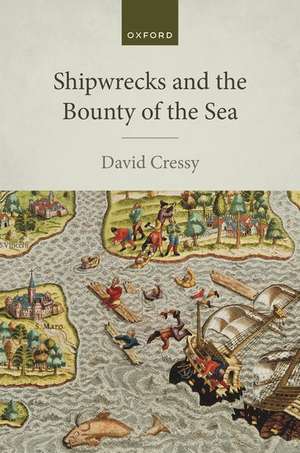Shipwrecks and the Bounty of the Sea
Autor David Cressyen Limba Engleză Hardback – 8 sep 2022
Preț: 248.19 lei
Preț vechi: 272.10 lei
-9% Nou
Puncte Express: 372
Preț estimativ în valută:
47.49€ • 51.79$ • 40.05£
47.49€ • 51.79$ • 40.05£
Carte disponibilă
Livrare economică 24-29 martie
Livrare express 19-25 martie pentru 64.44 lei
Preluare comenzi: 021 569.72.76
Specificații
ISBN-13: 9780192863393
ISBN-10: 0192863398
Pagini: 336
Ilustrații: 10 black and white illustrations
Dimensiuni: 162 x 240 x 24 mm
Greutate: 0.66 kg
Editura: OUP OXFORD
Colecția OUP Oxford
Locul publicării:Oxford, United Kingdom
ISBN-10: 0192863398
Pagini: 336
Ilustrații: 10 black and white illustrations
Dimensiuni: 162 x 240 x 24 mm
Greutate: 0.66 kg
Editura: OUP OXFORD
Colecția OUP Oxford
Locul publicării:Oxford, United Kingdom
Recenzii
David Cressy, a historian of early modern Britain, wants to rescue these customs from such condescension. He argues that salvaging goods from wrecked ships formed part of the 'moral economy' of maritime communities, borrowing E.P. Thompson's famous explanation for early modern food riots.
There are already a number of scientific writings from various disciplines that deal with shipwrecking. Few, however, address the social and legal implications of such events, further activities they prompted, and the interactions among the groups involved. Cressy shows more clearly than previous studies, a transition to a different phase, with new actors and conditions on the coast than those at sea.
Shipwrecks and the Bounty of the Sea is a welcome addition to a growing field within maritime studies. For those interested in the subject, this is a very enjoyable read. While Cressy covers a wide range of topics, the target audience is more for specialists in maritime history or studies, especially those of the Elizabethan and Stuart periods. Those with an interest in Wreccum Maris, or the intersections between culture and the sea in the early modern period, will find this work of great interest.
It's never too late to learn new stuff, even about shipwrecks. Like, for instance, I knew that things floating were flotsam; things deliberately thrown overboard were jetsam.
David Cressy is to be congratulated on producing an empirical and very well-illustrated study of a subject too often consigned to the realms of myth, legend and exaggeration.
Shipwrecks and the Bounty of the Sea is a book of learning and erudition, and it succeeds ably in highlighting the scale of shipwrecks and salvage and their importance to the very fabric of early modern Britain. It is recommended to all those interested in understanding Britain's history as an island nation at a period when maritime trade and travel were rapidly expanding.
There are already a number of scientific writings from various disciplines that deal with shipwrecking. Few, however, address the social and legal implications of such events, further activities they prompted, and the interactions among the groups involved. Cressy shows more clearly than previous studies, a transition to a different phase, with new actors and conditions on the coast than those at sea.
Shipwrecks and the Bounty of the Sea is a welcome addition to a growing field within maritime studies. For those interested in the subject, this is a very enjoyable read. While Cressy covers a wide range of topics, the target audience is more for specialists in maritime history or studies, especially those of the Elizabethan and Stuart periods. Those with an interest in Wreccum Maris, or the intersections between culture and the sea in the early modern period, will find this work of great interest.
It's never too late to learn new stuff, even about shipwrecks. Like, for instance, I knew that things floating were flotsam; things deliberately thrown overboard were jetsam.
David Cressy is to be congratulated on producing an empirical and very well-illustrated study of a subject too often consigned to the realms of myth, legend and exaggeration.
Shipwrecks and the Bounty of the Sea is a book of learning and erudition, and it succeeds ably in highlighting the scale of shipwrecks and salvage and their importance to the very fabric of early modern Britain. It is recommended to all those interested in understanding Britain's history as an island nation at a period when maritime trade and travel were rapidly expanding.
Notă biografică
Born and educated in England, David Cressy has made his career in the United States as an historian of early modern Britain. He taught in the Claremont Colleges, California State University Long Beach, and the Ohio State University before retiring to write and travel. When not in British archives and libraries he may be found exploring the beaches and deserts of the American West.
